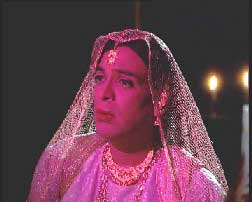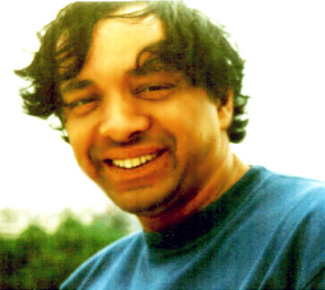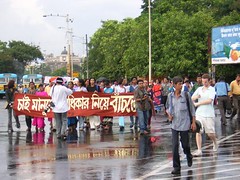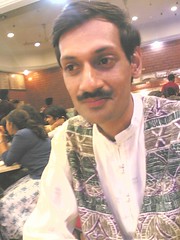 A still from Gulabi Aaina
A still from Gulabi Aaina
Like Jesus Christ is said to have told Peter, ‘Before the cock crow, thou shalt deny me thrice’, the Indian Censor Board in Delhi has banned Sridhar Rangayan’s film on drag queens thrice over.
While in April 2003 the censor board refused
‘Gulabi Aaina’ (The Pink Mirror) a certificate because it is “full of obscenity and vulgarity”, recently in April 2006, the board has done a complete change of tack to keep the film in the closet! The revising committee and the second revising committee refused it a certificate because in their opinion “the film Gulabi Aaina deals with an extremely complex issue of alternate sexuality in a peripheral manner”. Further, the board’s order states, “The problems and isolation faced by transvestites has not been dealt with in a holistic manner. Thus the film is refused certification as per relevant provisions of Cinematograph Act 1952”.
No, there’s no need to be happy or shocked that our esteemed State-appointed gatekeepers of art have discovered that most Indian filmmakers, when they are not invisibilizing homosexuality, are making fun of it. Theirs is neither a response to the ‘Girlfriend’ shock or to the ‘My Brother Nikhil’ balm. At worst it is an insidious, invidious game plan to keep a movie that makes no bones about same-sex desire and its natural ness with loads of humor hidden from the public gaze. At best, it is the sheer arrogance of an ignorant lot with no idea about the medium or the subject giving short shrift to the intelligence of both the audience and the filmmaker.
Sridhar is justifiably enraged and ready to join battle. He is planning to fight it out by taking the issue to the tribunal. (Also, see his comments below on the guidelines under which the committee reviewed the film and rejected it.) Fighting a battle for three years to get his film reviewed by the Board, Sridhar says he came across several skeletons in the censor board’s cupboard: “From those who write censor scripts, but actually offer their services as touts to get the film passed by censors to filmmakers who add six scenes of violence so that the censors can cut three and pass it. I even found out from reliable sources that a recent, acclaimed gay film was passed by the Censor Board on payment of certain monies.”
While Sridhar does praise the Board’s chairperson Sharmila Tagore and the regional officer at Delhi who “at least gave the film a fair chance by putting it up for review”, he is critical of the revising committee: “It was ridiculous sitting in front of six people and having to explain why I made the film and what I have tried to say in the film. If I could say it all verbally, then why did I have to use a visual medium like film!
“Peripheral and not holistic?! What do they expect me to say in 40 minutes, which is the length of my film. Moreover, ‘Gulabi Aaina’ is not a documentary. I wanted it to be an entertainer, but layered with subtext. When you do a film about gays, everyone expects a preachy message or a downright maudlin tearjerker. I wanted the audience to laugh with the characters instead of at them. Isn’t that good enough reason to make the film and have it reach viewers? It’s a different way of sensitizing.”
The Board really takes the cake and the pudding for implying that Sridhar’s film is insensitive to the problems faced by what it calls “transvestites”. In fact, that requires a vast stretch of imagination considering that Sridhar has been one of the forbearers of the gay rights movement in Bombay, being deeply involved with 'Bombay Dost' and The Humsafar Trust. It’s like calling Arjun Singh insensitive to the plight of OBC students (In Singh’s case, we are not sure whether his sincerity is for the OBC cause or to his own political survival).
The feckless, hypocrites in the committee after all the 'tamasha' of interrogating Sridhar about the film didn’t have the balls to pass the film. Says he, “They pretend they are broadminded, but when it comes to films with an alternate take, they cower. Basically, I have realized they wanted my characters to cry over their fate. They didn’t take too kindly to the fact that I showed gays and drag queens happy with their lives and being unapologetic. They wanted a daily soap with buckets of tears!” If Ekta Kapoor was looking for 'chamchas', she would have found them there.

Sridhar Rangayan
Meanwhile, Sridhar is looking for your support, especially if you are from the film fraternity and/or the gay community: “My fight is about freedom of expression as a filmmaker, and I damn well know how to use it sensitively and sensibly.”
Thankfully, Sridhar’s latest film
‘Yours Emotionally!’ has been produced by a UK based production house so no going through the sicko censors this time!
Crafty Censors
Instead of protecting the citizens, more often the State uses the law to terrorize them and curb their rights. Our censorship guidelines have also been similarly twisted to restrict free speech and discussion of homosexuality.
While an in-depth look at the guidelines is needed, Sridhar gave his responses to some of the guidelines under which the committee reviewed ‘Gulabi Aaina’ and rejected it:
- The medium of film remains responsible and sensitive to the values and standards of society.
“Nowhere is it mentioned what are these great values and standards of the society that they talk about. It is all a thick cloud in the air that the moral policemen comfortably hide under.”
- Artistic expression and creative freedom are not unduly curbed.
“But that’s exactly what they are doing by banning my film. It’s utterly ridiculous!”
- Certification is responsive to social change.
“If they keep refusing certificate to films that are away from the mainstream and attempt to discuss alternate issues, how do they expect any social change to happen? All they want is to maintain a status quo so that none of them will be blamed for taking an issue forward. It’s the who-wants-to-bell-the-cat syndrome.”
- The medium of film provides clean and healthy entertainment.
“Just look at all the
masala films and skin flicks that get the Censor’s nod. Calling it clean and healthy entertainment is a big joke. Take a reality check folks!”
- As far as possible, the film is of aesthetic value and cinematically of good standard.“My film has been screened at 57 international film festivals and won Jury Awards for Best Film of the Festival in New York and France. Most of the reviews talk about the sensitive handling of the subject and it has been rated as ‘fabulous’, ‘compelling’, ‘unique’ and even ‘an excellent example of Indian cinema’ by a Spanish critic. An art historian at Ohio State University compared it to Shyam Benegal’s 'Mandi', saying it bridged the gap between ‘Fire’ and ‘Bombay Boys’ by “adding that breath of reality”. How much more aesthetic and cinematic value can I pump into the film to please the censors? Maybe I should include 5 grisly murders, 3 item numbers and a bevy of half-naked women!”






